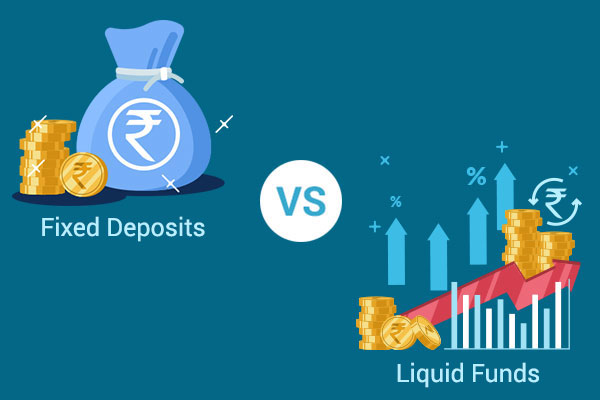Fixed Deposits vs Liquid Funds: A Detailed Guide

Investing your money is necessary to accumulate funds for future unforeseen emergencies and financial goals you have set for yourself. Investing in financial instruments that give added returns is a great way of dealing with inflation. Traditionally, people preferred investing only in Fixed Deposits (FDs) to grow their hard-earned money while keeping it safe.
With changing times, there are multiple options to invest your money. However, FDs and Liquid Funds are two commonly used investment products. Here is a detailed guide to everything you should know about the two investment types before putting your money in either.
What are Liquid Funds?
Liquid Funds are debt funds and can be understood as mutual funds that come under the short-term investment category. Liquid funds invest your money in financial instruments like treasury bills, corporate & government bonds with good ratings, and commercial papers. Liquid funds invest in market instruments with a maturity period of 91 days. Liquid funds are safer than other mutual funds and benefit capital preservation.
Who Should Invest in Liquid Funds?
Liquid funds come with low risk and are ideal for investors who do not like to take a lot of risk on their money. You can invest your idle or surplus cash in Liquid Funds without worrying about its safety. They provide better returns than savings accounts. You can invest your incentives, bonuses, and other cash inflows in these funds for good returns.
What are Fixed Deposits?
Fixed Deposits or bank deposits are lump sum investment instruments that give guaranteed returns in a pre-decided tenure ranging from 7 days to 20 years. They are one of the oldest and most trusted investment options in India. The interest rate of FD varies for different banks. With an FD calculator, FD benefits can be calculated in terms of how much money you will receive by the end of the FD tenure.
You can further benefit from the interest rate of FDs by putting your money into a cumulative FD, where your interest payouts get reinvested along with your principal to give you the benefit of interest on interest. FDs can be a source of regular income if you invest in a non-cumulative FD and decide to take periodic payouts on your invested money.
Who Should Invest in Fixed Deposits?
If you are an investor who does not like to take a risk on your money, you can invest in an FD. Fixed Deposits, especially ones offered by reputed banks, are safer as they are always under the purview of the central bank. You can take additional benefits from your FD if you can invest your money for a longer tenure or take benefit of special offers like senior citizen FDs.
Difference Between Fixed Deposits Vs Liquid Funds
Feature |
Fixed Deposits |
Liquid Funds |
Risk |
Fixed Deposits are a safe investment tool and do not put your money at risk. Further, FD accounts usually have an insurance cover of up to Rs. 5 lakhs per bank account on the invested capital, making them even more reliable. |
Liquid Funds have a slightly higher risk exposure than FDs since they invest your money in fixed-income instruments that are dependent on market volatility and the economy’s state. |
Returns |
The returns on FDs are pre-decided. When you open an FD account, the interest receivable gets fixed at that point and remains constant for the life of the FD. FD returns are monitored by the central bank and depend on the economy’s state and the country’s financial stability. |
Liquid Funds offer better returns than FDs, but the returns are not pre-decided. Choosing the right fund manager when investing in a Liquid Fund is crucial. Depending on your risk appetite, the manager must put your money at risk. |
Liquidity |
Fixed Deposits have a fixed tenure, and you can liquidate your FD prematurely, but you will have to pay a penalty fee. |
You can redeem your Liquid Funds whenever you want, but there will be an exit load on the liquidation of the Fund within seven days of holding them. |
Investment Horizon |
Their tenure ranges from 7 days to 20 years. |
They come with a maturity of up to 91 days. |
Taxation |
The interest returns on FDs are taxable. |
If you hold Liquid Funds for more than three years, they are considered long-term capital gains. For less than three years, the returns are taxed as per the investor’s income slab. |
The Final Word
Fixed Deposits and Liquid Funds are both great investment options, and you can choose between the two depending on how much risk you want to take on your money. If you are looking for assured returns, you can opt for FDs. The calculator FD interest can help you determine your earnings in advance, and you can plan your future expenses accordingly.

 Blog
Blog Blog
Blog



Comments
No comments yet.